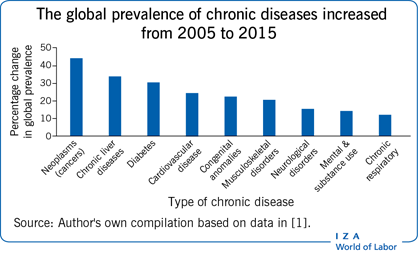Elevator pitch
Chronic health conditions are a global concern and can impact labor market outcomes of those diagnosed and their caregivers. Since the global prevalence of many chronic health conditions is on the rise, it is important to know what firms can do to retain and hire workers who are impacted. Firms can improve hiring by addressing biases against potential employees with chronic health conditions. Furthermore, firms can retain impacted workers by offering workplace flexibility such as partial sick leave, work hour flexibility, and part-time work options.
Key findings
Pros
Firms often face less competition in hiring productive workers with disabilities.
Firms can benefit by considering why potential employees have employment gaps.
Firms that reduce workplace bullying can benefit from reductions in sickness absenteeism among women and job exits among men.
Firms benefit more from partial sick leave programs when work resumption starts within 26 weeks and the initial work capacity starts at a sufficiently high level.
Through flexible working hours and allowing them to shift to part-time work, firms can retain parents of children with a chronic health condition.
Cons
Having a chronic health condition often leads to worse earnings and lower levels of employment.
Mothers of children with a chronic health condition have worse labor market outcomes.
A cancer diagnosis leads to lower income for both the person diagnosed and his/her spouse.
Disability wage subsidies do not change firms’ hiring decisions.
Workplace wellness programs do not improve worker health, absenteeism, productivity, or retention.
